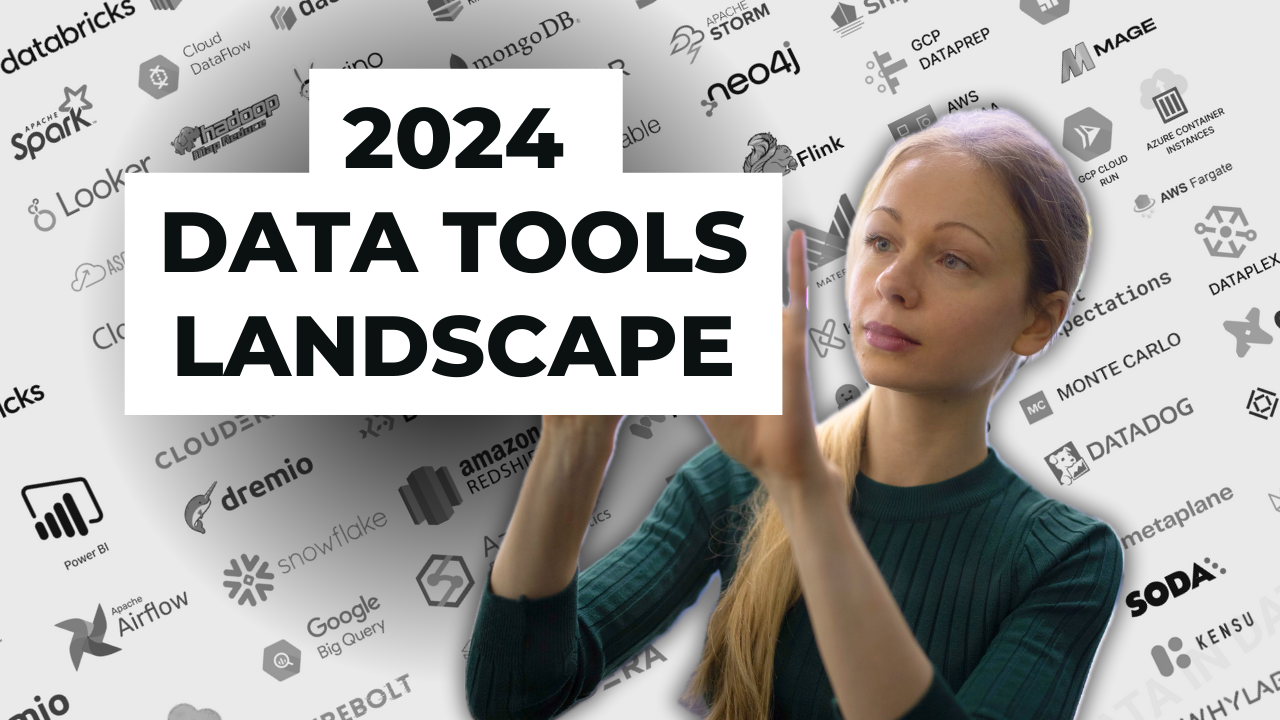2024 DATA TOOLS LANDSCAPE

Data landscape could be overwhelmingly robust, so here is a chance to pull in all the tools out there.
Click for a better resolution:

Big shoutout to the crew of senior data experts who helped me out. Their insights and experience were like gold, giving a much-needed extra set of eyes on everything. (Credits are below)
The map is useful from Juniors to Seniors:
- Junior could have a better overview of what is happening in the market
- while seasoned specialists might peek at better alternatives for their solutions
Let's go through each section:
DATABASES:
- Here Relational & NoSQL tools like PostgreSQL, MongoDB, and Redis have been staples in many organizations. The trend towards flexible schema and faster querying is evident.
- Vector and Graph Databases: These ones deserve a separate space now. As with advancements in LLMs, tools like Neo4j and ChromaDB are gaining prominence for their ability to handle complex relationships and large-scale graph computations. We'll see how 2024 gonna advance that
STORAGE:
- The separation of storage and compute, a trend championed by technologies like Amazon S3 and Google Cloud Storage, allows for more scalable and cost-effective data solutions.
DATA WAREHOUSE:
- The contrast between the cloud-native approach and the traditional warehousing solutions (like Oracle) demonstrated the industry’s shift towards more agile and scalable solutions for many years so far. The big battle right now is between Databricks and Snowflake: Both are data lakehouses. They combine the features of data warehouses and data lakes to provide the best of both worlds in data storage and computing. They decouple their storage and computing options, so they are independently scaleable.
OPEN DATA FORMAT:
- Open formats like Apache Iceberg and Delta Lake are becoming more popular. Dremio’s benchmark studies provide valuable insights into their performance.
INGESTION:
- Tools like Apache Kafka have revolutionized data ingestion. The emergence of Reverse ETL, which syncs processed data back to operational systems, is a trend to watch.
PIPELINES:
- Beyond Airflow and dbt, tools like Apache Nifi and Prefect are gaining traction for their flexibility and ease of use in pipeline management.
SERVERLESS:
- AWS Lambda and Azure Functions are leading the charge in serverless computing, allowing data professionals to focus more on data and less on infrastructure.
DATA QUALITY / OBSERVABILITY:
- So many players on the market out there. The rise of tools like Great Expectations and Datafold reflects the increasing focus on data quality and observability in complex data ecosystems.
DATA CATALOG / GOVERNANCE:
- With growing concerns around data privacy and compliance, tools like Acryl Data, Collibra or Apache Atlas are becoming essential for data governance.
ANALYTICS:
- Traditional BI tools like PowerBI are being complemented by specialized log analysis tools like Splunk or search analysis like ElasticSearch.
MLOPS:
- The integration of ML workflows into the broader operational process is streamlined by tools like Kubeflow and MLflow.
DATA-CENTRIC AI/ML:
- This approach focuses on improving data quality and relevance for better ML models. Tools supporting this paradigm are emerging as crucial components in AI strategies. DVC call themselves "Data Version Control for the GenAI era", while Pachyderm days they are "Data-driven pipelines for ML"
ML OBSERVABILITY AND MONITORING:
- Unlike traditional software, ML models can degrade in performance due to changes in input data (data drift) or environment (concept drift).
- Observability helps in identifying and diagnosing these issues, ensuring that models continue to perform as expected.
- The field is evolving rapidly with advancements in automated monitoring, explainable AI, and proactive model maintenance strategies.
P.S. If you feel like some tools should have been added here, I kindly ask you to contribute. It's quite a dynamic field, so I would gladly add updates to it below, and tag you!
Special thanks to: Mahdi Karabiben @mahdiqb, Abhishek Tripathi @data_coffe, Luqman Afif @luqman_afif96, Anirudh Jain @ani_jain_555, Dustin Hirschi @duthirshi, Felipe Sibuya @felipesibuya
